This website uses cookies so that we can provide you with the best user experience possible. Cookie information is stored in your browser and performs functions such as recognising you when you return to our website and helping our team to understand which sections of the website you find most interesting and useful.
Food and drink in Asia
The fascinating food and drink found throughout Asia have inspired dishes across the world. Rich and fragrant, and always prepared using the freshest ingredients and a meticulous blend of spices passed down through generations.
Food is an extremely important part of most Asian cultures, as it reflects the region’s history. Whether it be a scented curry in India or a bowl of warming noodle soup in Vietnam. There is passion in every mouthful.
Street food will make your taste buds dance and put a smile on your face. Guaranteed to have you coming back time and time again.
Whilst there are parallels between some iconic dishes, each nation has its own take on what makes the best dish. Variety adds authenticity and insight into the local culture from which they emerged. Here we’ve listed some of the culinary highlights of Asia, from well-known classics to unique dishes. Enjoy!
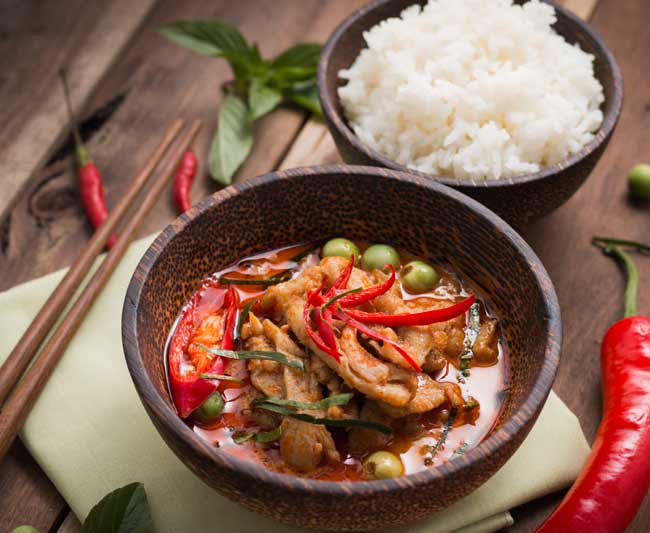
Something different: Green papaya salad. This flavoursome salad has a base of shredded papaya topped with peanuts, spices and chillis. Be warned, this speciality can often be seriously spicy.
Thai food is fresh, varied and mouthwateringly flavoursome. Most dishes in Thailand are rice- or noodle-based. We love delicious pad thai, noodles with chilli, lime and peanuts, and khao soi, a soup topped with fried noodles. The fragrant scent of a classic Thai green curry or an alternative massaman curry is never too far away. Fruit juice vendors will blend any selection of fresh local fruit right in front of your eyes. If you still have room for dessert, then try mango sticky rice topped with a sweet coconut sauce.
Whilst there are similarities between Sri Lankan and Indian cuisines, the wonders of Sri Lankan cuisine deserve recognition. Aromatic curries, flavoursome chutneys and the freshest seafood can be found throughout the country. However, the best food in Sri Lanka comes in the form of its unique local classics. Pol sambol, for example (a spicy, coconut-based chutney eaten with roti). Sri Lanka, the world’s fourth-largest producer of tea, is also perfect for those who love their morning brew.
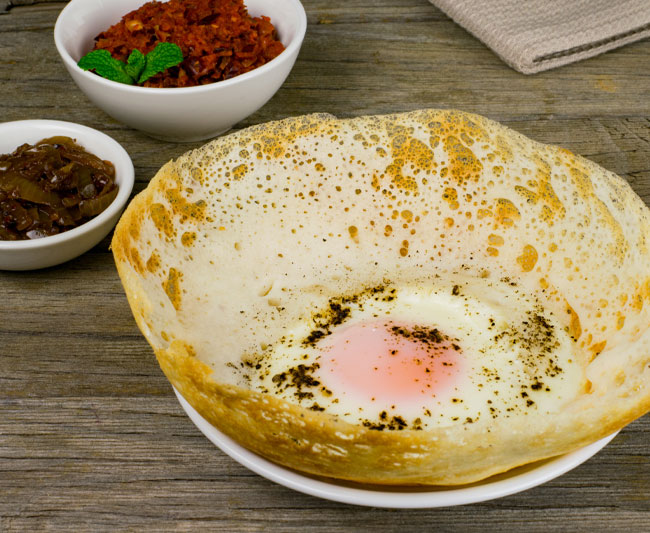
Something different: Kottu roti. Shreds of roti are added to a curry of mixed vegetables and, occasionally, crab meat.
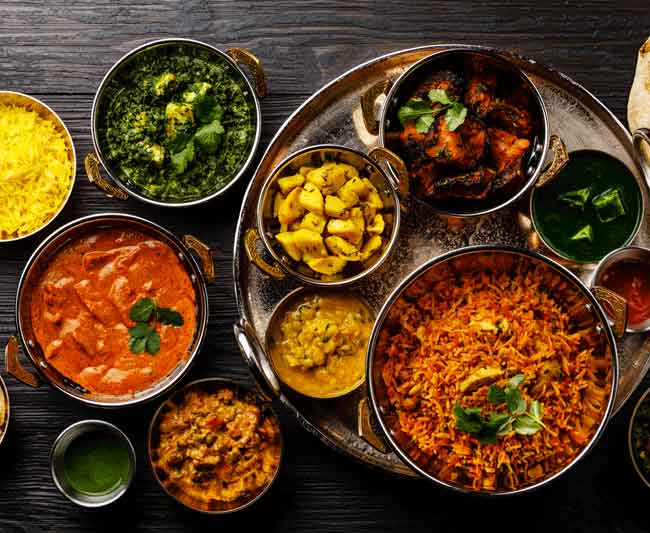
Something different: Kachori. These deep-fried discs are typically found in northern India and can be filled with onions, peas or lentils. They are served with chutney for dipping.
Curry, the nation’s signature dish, comes in many forms. From the rich, lentil and chickpea-based curries of the north to the coconut-infused fish curries of the south. With so many choices, it can be challenging to decide which curry takes your preference. We recommend ordering a thali – a selection of curries, dhal, chutney, rice and a chapati. However, Indian cuisine extends beyond curries.
We love masala dosas (a rice-based wrap containing curried vegetables), idlis (light rice cakes with a selection of dipping sauces), and lassis (a smooth yoghurt-based drink). Each region has its own speciality, so make sure to check out what’s best to try in the area you are staying in. For more information on India’s seemingly endless food options have a read of our more comprehensive guide to food and drink in India.
Truly unique and utterly flavourful, Vietnamese food blends flavours from the region in an ingenious manner. The delicately flavoured noodle broth of pho and wholesome pork baguettes in the form of banh mi have rightly become firm favourites in western culture but so many other traditional classics are yet to have migrated from the country’s bustling street food vendors. Local favourites include the glutenous banh trang nuong, a barbecued rice paper treat topped with egg and expertly balanced herbs, and hoi cuon, fresh spring rolls with crunchy vegetables, delicate spices and fresh prawns.
You’ll often wonder what goes into some of the food and most likely won’t be able to pronounce their names but we advise you dive into the street food scene with an open mind and treat your tastebuds to the spectacular flavours on offer. For more details about the culinary delights of Vietnam have a read of our blog by clicking here.
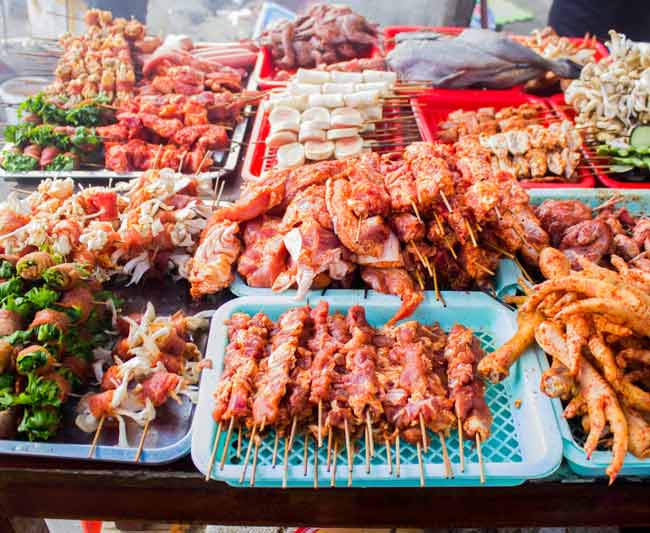
Something different: Bahn cuon. Pork, prawns and mushrooms are ground up, wrapped in fresh sheets of rice, topped with crispy onions and served with an aromatic dipping sauce.
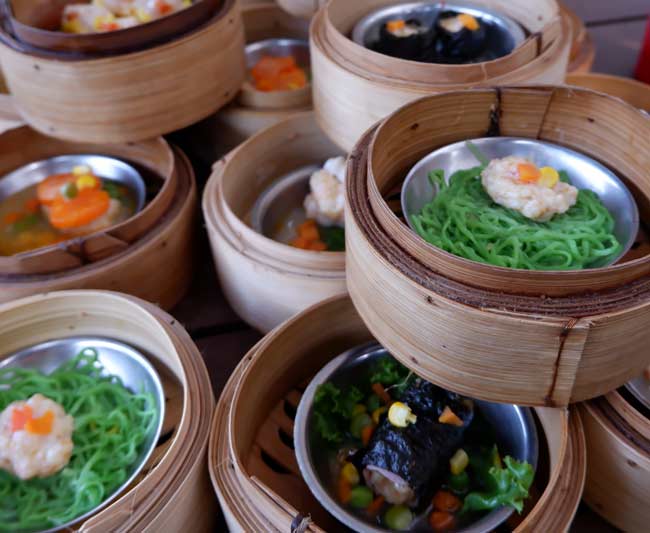
Something different: Century eggs. This pungent, gelatinous snack is created by coating an egg in a paste containing ash before burying it in the ground for up to 100 days. The eggs take on a particularly potent flavour – an acquired taste for sure.
Chinese food has become more readily available in the west than some western cuisines, however traditional Chinese cuisine is quite different to its western equivalent. As Chinese culture has a reluctance to waste any part of an ingredient, you will likely come across some truly strange dishes when walking through the local food markets, including delicacies like chicken feet and fish eyes. However, if you’re not the type to sample such experimental nibbles there are more typical and extremely delicious options available. Local Chinese favourites include steamed dumplings, hot pots and roasted peking duck.
An interesting point to note is that it is considered polite to leave some food once you have finished eating, as licking your plate clean is a sign that your host did not feed you enough. For more on Chinese cuisine and etiquette have a read of our blog on the food and drink of offer in this vast and varied nation.
The Japanese diet is considered amongst the healthiest in the world. With an emphasis on the freshest ingredients, most meals in Japan have subtle but enticing flavours. Seafood makes up a large portion of the diet in Japan and, as one would expect, sushi is readily available in most parts of the country. Other staples include tender gyoza dumplings, fragrant ramen and udon noodle dishes, hearty bowls of nabe hot pot and expertly grilled yakitori chicken skewers.
For those fortunate enough to have a substantial spending budget in Japan, kobe beef is a sumptuous must have. Perfectly marbled and beautifully tender, kobe beef comes from a very specific breed of cattle raised in a small southern region of the country. A truly rare melt-in-the-mouth treat.
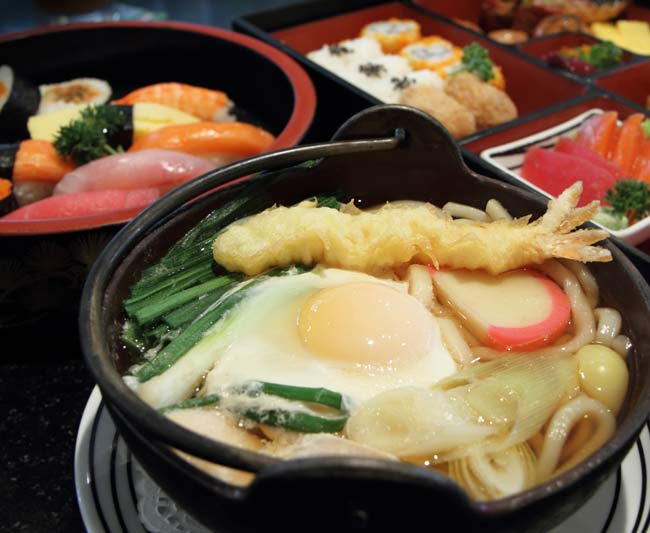
Something different: Okonomiyaki. A savoury pancake made with cabbage and spring onions, topped with your choice of succulent meat or fresh seafood.
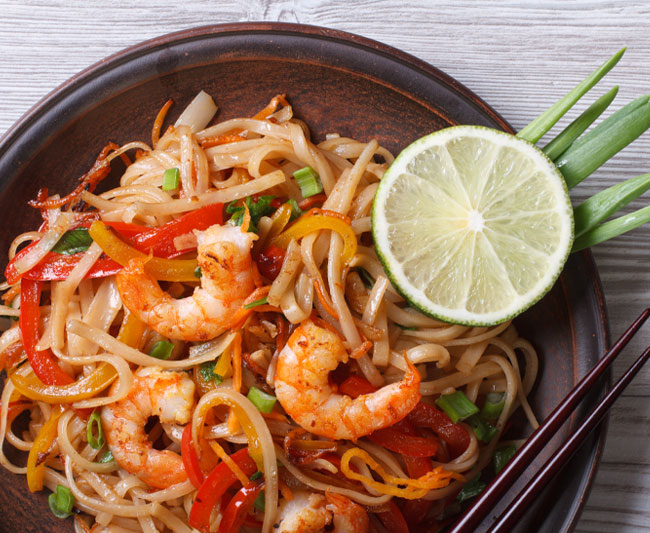
Something different: Chee cheong fun. Steamed rice rolls drizzled in any of a number of delicious sauces. This simple yet flavoursome dish originated in China before being brought over by immigrants during the 19th century.
With cultural influences from both China and India, Malaysian food fuses some of the greatest flavours from the far flung corners of the continent. Scrumptious noodle soups bursting with flavour are a must try. Assam laksa, a spicy soup with wholesome chunks of fresh fish, is a particular favourite, whilst koay chiap offers a meaty alternative, with succulent shredded duck meat in a soy based broth. The tempting scent of street food seems to follow you everywhere in Malaysia, reassuring you that a swift snack is never too far away. Batu maung satay, or barbecued chicken skewers with a hot peanut sauce, are an ideal snack for those looking to eat on the go in one of Penang’s famous night markets.
We are passionate adventure travelers who want to share the world and our travel experiences with everyone…
